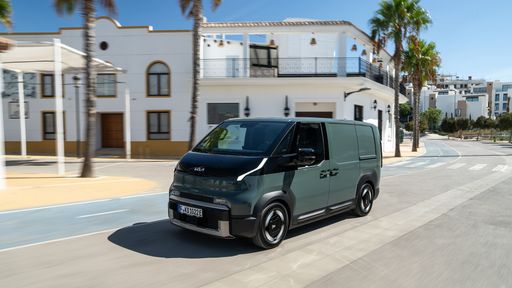Toyota Proace Transporter vs Kia PV5 - Differences and prices compared
Compare performance (150 HP vs 163 HP), boot space and price (31600 £ vs 32800 £ ) at a glance. Find out which car is the better choice for you – Toyota Proace Transporter or Kia PV5?
Costs and Efficiency:
Looking at overall running costs, both models reveal some interesting differences in everyday economy.
Toyota Proace Transporter has a barely noticeable advantage in terms of price – it starts at 31600 £ , while the Kia PV5 costs 32800 £ . That’s a price difference of around 1185 £.
In terms of energy consumption, the advantage goes to the Kia PV5: with 19 kWh per 100 km, it’s clearly perceptible more efficient than the Toyota Proace Transporter with 23.80 kWh. That’s a difference of about 4.80 kWh.
As for electric range, the Kia PV5 performs somewhat better – achieving up to 416 km, about 67 km more than the Toyota Proace Transporter.
Engine and Performance:
Power, torque and acceleration are the classic benchmarks for car enthusiasts – and here, some clear differences start to show.
When it comes to engine power, the Kia PV5 has a minimal edge – offering 163 HP compared to 150 HP. That’s roughly 13 HP more horsepower.
In acceleration from 0 to 100 km/h, the Kia PV5 is to a small extent quicker – completing the sprint in 10.60 s, while the Toyota Proace Transporter takes 12.10 s. That’s about 1.50 s faster.
There’s also a difference in torque: Toyota Proace Transporter pulls noticeable stronger with 370 Nm compared to 250 Nm. That’s about 120 Nm difference.
Space and Everyday Use:
Cabin size, boot volume and payload all play a role in everyday practicality. Here, comfort and flexibility make the difference.
Seats: Toyota Proace Transporter offers to a small extent more seating capacity – 6 vs 5.
In curb weight, Toyota Proace Transporter is to a small extent lighter – 1656 kg compared to 1860 kg. The difference is around 204 kg.
When it comes to payload, Toyota Proace Transporter clearly takes the win – 1323 kg compared to 790 kg. That’s a difference of about 533 kg.
Who wins the race in the data check?
The Toyota Proace Transporter comes out modestly ahead in the objective data comparison.
This result only shows which model scores more points on paper – not which of the two cars feels right for you.
Costs and Consumption
View detailed analysis
Engine and Performance
View detailed analysis
Dimensions and Body
View detailed analysis

Toyota Proace Transporter
Toyota Proace Transporter
The Toyota Proace Transporter is a no-nonsense work van that pairs Toyota’s dependable reputation with smart practicality, so you can load, drive and finish the job without unnecessary drama. It won’t win design awards, but with a comfortable cab, sensible feature set and a focus on getting things done, it quietly keeps fleets and small businesses smiling.
detailsKia PV5
The Kia EV5 is an exciting new entrant in the landscape of electric SUVs, promising a blend of style and innovation that captures attention. It boasts a sleek and modern design that aligns with Kia's evolving aesthetic identity, blending practicality with eye-catching details. With its foray into the electric vehicle segment, the EV5 is set to offer a highly competitive option for those looking to embrace sustainable mobility without compromising on comfort or tech features.
details



Costs and Consumption |
|
|---|---|
|
Price
31600 - 51000 £
|
Price
32800 - 38900 £
|
|
Consumption L/100km
6.4 - 6.7 L
|
Consumption L/100km
-
|
|
Consumption kWh/100km
23.8 - 23.9 kWh
|
Consumption kWh/100km
19 - 19.3 kWh
|
|
Electric Range
221 - 349 km
|
Electric Range
295 - 416 km
|
|
Battery Capacity
-
|
Battery Capacity
-
|
|
co2
0 - 177 g/km
|
co2
0 g/km
|
|
Fuel tank capacity
69 L
|
Fuel tank capacity
-
|
Dimensions and Body |
|
|---|---|
|
Body Type
Cargo Van
|
Body Type
Cargo Van, Bus
|
|
Seats
3 - 6
|
Seats
2 - 5
|
|
Doors
4 - 5
|
Doors
-
|
|
Curb weight
1656 - 2100 kg
|
Curb weight
1860 - 2145 kg
|
|
Trunk capacity
-
|
Trunk capacity
1330 L
|
|
Length
4980 - 5330 mm
|
Length
-
|
|
Width
1920 mm
|
Width
1895 mm
|
|
Height
1895 - 1935 mm
|
Height
-
|
|
Max trunk capacity
3200 - 6600 L
|
Max trunk capacity
-
|
|
Payload
955 - 1323 kg
|
Payload
455 - 790 kg
|
Engine and Performance |
|
|---|---|
|
Engine Type
Electric, Diesel
|
Engine Type
Electric
|
|
Transmission
Automatic, Manuel
|
Transmission
Automatic
|
|
Transmission Detail
Reduction Gearbox, Manual Gearbox, Automatic Gearbox
|
Transmission Detail
Reduction Gearbox
|
|
Drive Type
Front-Wheel Drive
|
Drive Type
Front-Wheel Drive
|
|
Power HP
120 - 150 HP
|
Power HP
121 - 163 HP
|
|
Acceleration 0-100km/h
12.1 - 13.3 s
|
Acceleration 0-100km/h
10.6 - 16.2 s
|
|
Max Speed
130 - 170 km/h
|
Max Speed
-
|
|
Torque
260 - 370 Nm
|
Torque
250 Nm
|
|
Number of Cylinders
4
|
Number of Cylinders
-
|
|
Power kW
88 - 110 kW
|
Power kW
89 - 120 kW
|
|
Engine capacity
1499 - 2184 cm3
|
Engine capacity
-
|
General |
|
|---|---|
|
Model Year
2024 - 2025
|
Model Year
2025
|
|
CO2 Efficiency Class
A
|
CO2 Efficiency Class
A
|
|
Brand
Toyota
|
Brand
Kia
|
Is the Toyota Proace Transporter offered with different drivetrains?
Available configurations include Front-Wheel Drive.
